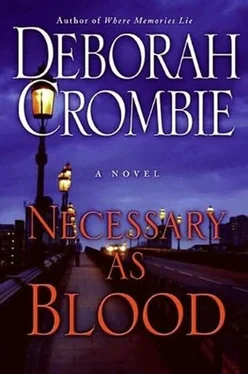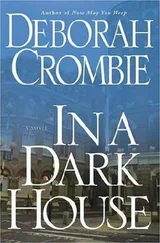Louise half filled the glass with gin, then topped it off with tonic. “After Sandra disappeared, Naz rewrote his will. He asked me if I would be Charlotte’s guardian.” She turned, leaning against the work top, but didn’t meet Gemma’s eyes. “I said no.”
Gemma stared at her in disbelief. “Why?”
“Because…because I didn’t think anything would happen to Naz. Because I thought Sandra would come back. And then, when she didn’t, I thought-I began to wonder-I know most of these things are…domestic.” She looked at Gemma now, appealing. “It’s my job. Yours, too. We see the worst.”
“As in it’s usually the spouse? You thought Naz was responsible for Sandra’s disappearance?”
“God help me.” Louise reached for her glass and wrapped visibly unsteady hands round it. “I suspected him. I didn’t see how he could have done it. But he was so different afterwards, so distant-I thought…And I was so angry with him because he shut me out. If he talked at all, it was about this friend, this Dr. Cavendish, when Naz and I had been friends for years. I was jealous. It was petty of me, and stupid. And now…now I can’t put it right.”
“Can’t you? Louise, couldn’t you change things now, as executor? Isn’t there some way you could take legal responsibility for Charlotte?”
Louise shook her head. “No. The will was witnessed. It will stand.” She hesitated, then said, “I’m sorry I didn’t do what Naz wanted, I really am. But even if it were legally possible, I couldn’t take care of Charlotte.”
“I don’t understand.”
“I-I’m not cut out for it. I don’t-I’m fond of Charlotte, but she never really…warmed to me. This”-she looked towards the balcony-“this place, and Tam and Michael, this is all I’m likely to have in the way of family. I’m just not suited to looking after a child.”
“And you think Gail Gilles would do better?”
Although it was a struggle to keep her temper in check, Gemma had gone back out to the balcony and sat for a while longer with Louise. She had tried to imagine Charlotte with Louise, and found to her dismay that she couldn’t.
There was something about Louise, something more than her obvious grief, that wasn’t quite right. She seemed damaged, crippled in some indefinable way, and there was a solicitousness in the way Michael and his partner, Tam, looked after her.
In the end, she had got Louise to agree that she would do what she could, if Gail should gain custody of Charlotte, to restrict Gail’s access to the estate’s funds.
And then, as she drove the short distance to Fournier Street in the fading light, Gemma wondered if that had been a wise request. Would putting a damper on the money only make Gail more likely to mistreat the child?
She parked across from Sandra and Naz’s house, struck once again by the contrast between the severity of the church at one end of the street and the play of neon from Brick Lane at the other. How hard had it been for Sandra and Naz to balance between the two worlds? And the two cultures?
Once inside the house, she switched on lights and opened the garden door in an effort to bring in light and fresh air. In just a few days, the house had begun to smell musty, and ordinary dust had gathered on the furniture, joining the black powder left by forensics.
She walked through the rooms, feeling oddly divided between a sense of trespass and a sense of aching familiarity. In the sitting room, she picked up a stray picture book and a stuffed toy, stowing them in their respective containers, just as she would have in her own house.
Then she climbed the stairs to Charlotte’s room. She found a flowered holdall in the wardrobe and began to fill it with things from the chest of drawers. She held up a pink-printed sundress with a matching white cardigan, remembering the little girls’ clothes she had looked at in the shop windows when she was pregnant, daydreaming of the daughter she would dress.
Carefully, she folded the sundress and cardigan, then reached for a jacket in the same corally pink, a pink-and-white-striped T-shirt, and white cuffed dungarees. Then a yellow eyelet top with a pink-and-yellow-flowered skirt and a pair of pink-and-white ballet flats. Had Sandra loved picking out these things, just as Gemma had imagined doing?
She added a few more clothes and more worn stuffed toys-company for Bob the elephant-and the most well-thumbed of the picture books on the table by the bed. The photo of Sandra still stood beside the books. Gemma hesitated, but in the end she left it. Not yet, she thought. It was too soon for such a vivid reminder.
She made notes for Louise of the things she’d taken, then, leaving the bag on the landing, she climbed up to the studio.
The cup of colored pencils stood on the worktable, just where she had remembered. Looking round for a box or a bag, or even an elastic band to contain them, she was struck once more by the beauty of the collage Sandra had left unfinished.
The Caged Girls , as she had come to think of it. The shrouded, unfinished faces of the girls and women were haunting, and she wondered what story had motivated Sandra to design this piece-and who had been the intended recipient.
Still searching for an elastic band, she moved to the desk and rifled through the drawers. The shallow one held the flotsam and jetsam that accumulated in desks as if drawn by magnets-broken pencils, defunct pens, paper clips, and pennies. There were a half-dozen colored elastic bands, but they were too small for the bundled pencils. Pulling the drawer all the way open, Gemma saw a bit of paper crumpled at the back. She fished it out and smoothed the crinkles. It was a receipt, written out to Sandra Gilles for one pound, in payment for an unspecified work of art, and stamped with the name and address of the Rivington Street Health Clinic.
Gemma remembered seeing a clinic on Rivington Street when she’d gone to Pippa Nightingale’s gallery-was it the same place?
On an impulse, she took out her notebook once more and found the page on which she’d written Pippa’s number. As she looked in her bag, she found one of her own elastic hair bands, which she thought would do quite nicely for the pencils.
Bundling up the pencils, she put them in her bag, then took out her mobile and rang the number for the Nightingale Gallery. It was late, and Gemma had begun to think it a wasted call, but after a few rings, Pippa answered the phone.
Gemma identified herself, then asked about the Rivington Street clinic.
“That was one of Sandra’s good-works projects,” Pippa said with asperity. “I told her she couldn’t just give things away, but she wouldn’t listen.”
“They paid her a pound. I found the receipt in her desk. What sort of clinic is it?”
“That sounds about par for Sandra’s record keeping. At least she left a proper paper trail for the Internal Revenue.” She gave a derisive sniff, then went on. “The place is a free sexual-health clinic that caters mostly to local Bangladeshi women.”
Gemma had been gazing at the piece on the worktable. She described the piece in progress to Pippa, then asked, “Do you suppose she was thinking of the women who go to this clinic? Or that she was making it for the clinic?”
“It’s possible,” Pippa said thoughtfully. “But it sounds as if the piece has a very strong Huguenot theme, which was something Sandra came back to again and again. She was fascinated by the lives and history of the French immigrant weavers, and she felt a personal connection-she wanted there to be a personal connection. Gilles is a French Huguenot name, and because Sandra never knew her father, I think it was important to her to try to find something meaningful in her mother’s lineage. Not that her mother knew or cared.” Pippa sighed. “You might look at her journals.”
Читать дальше












